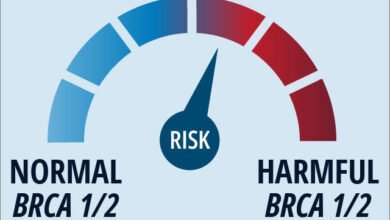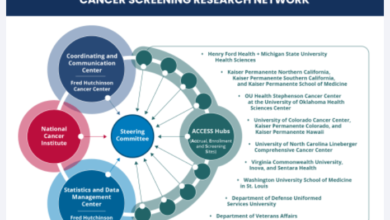AACR Special Conferences Gather Investigators Advancing Research on Gynecologic Cancers

Based on estimates from the National Cancer Institute, in 2023, more than 110,000 cases of gynecologic cancers are expected to be diagnosed in the U.S., and approximately 34,000 people will die from these diseases.
Gynecologic cancers are those that affect the female reproductive organs. The five main types are cervical, ovarian, vaginal, vulvar, and uterine cancer. The latter can form in the internal lining of the uterus, called the endometrium, or, more rarely, in the muscle layer or the supporting tissues.
Risk factors for gynecologic cancers include older age, obesity, a family history of cancer, carrying certain inherited genetic mutations, and infection with human papillomavirus.
Thanks to research advances, new therapies have become available to patients, but the burden of gynecologic cancers remains high. For example, ovarian cancer is still typically diagnosed at advanced stages, when it is more difficult to treat, and remains the fifth leading cause of cancer death among women. In contrast with the overall downward cancer mortality trend, endometrial cancer incidence and mortality are on the rise.
A better understanding of the molecular mechanisms underlying these diseases is key to developing new approaches for prevention, early detection, and more effective treatments. This fall, to facilitate the exchange of the latest research in the field, the American Association for Cancer Research will host Special Conferences dedicated to ovarian cancer and endometrial cancer, which will be held in Boston on October 5-7 and November 16-18, respectively.
To preview some of the main themes that will be discussed during these meetings, we interviewed two of the organizing co-chairs: Frances R. Balkwill, PhD, professor of cancer biology at Barts Cancer Institute of Queen Mary University of London, United Kingdom, and Victoria L. Bae-Jump, MD, PhD, professor of gynecologic oncology at University of North Carolina, Chapel Hill.
What is the scope of the AACR Special Conferences on Ovarian Cancer and Endometrial Cancer, and what are some of the highlights of the respective programs?
Balkwill: The ovarian cancer conference will showcase the latest research in the diseases that we collectively call ovarian cancer. It is an exciting time in ovarian cancer research, and this meeting is especially timely. We will highlight research areas that have the potential to make a difference for patients and to help the scientists in attendance advance their own work. In selecting the speakers, we have also tried to encourage new voices.
PhD
One important aspect of ovarian cancer research is that 10 or 15 years ago we thought ovarian cancer was one disease, while, in fact, we now know that it encompasses very different subtypes with different cells of origin, different natural history, and different treatments. I am very pleased that we will have a session devoted to the rare subtypes, which are more neglected diseases.
I’m excited to chair a session on the tumor microenvironment and its role in modulating the anticancer immune response, which is my area of interest. High grade serous ovarian cancer, which is the most common type, has a very complex tumor microenvironment that includes many of the immune cells that should be able to fight the cancer, yet this disease does not respond to some of the immunotherapies that have positive effects in other cancer types like melanoma, lung, and bladder cancer. This is one of the puzzles that we need to tease apart, and I hope the talks we have selected will help provide some light on that.
For example, there will be a talk about the link between the nervous system and the tumor microenvironment. There is some amazing research underway to elucidate how the tumor doesn’t just corrupt immune cells, fibroblasts, and blood vessels, but also the nerves. Other talks in this session will focus on the therapeutic potential of monocytes and macrophages and how to counteract the immunosuppressive forces that stop the immune cells from recognizing and destroying the malignant cells.

MD, PhD
Bae-Jump: Endometrial cancer overall is the only major cancer type for which both frequency and mortality increase every year and is one of the most underfunded areas in cancer research. That is why it is so important to have this meeting, and I am so happy that AACR is calling attention to this cancer and convening the scientists studying it, so we can work together to make things better for patients.
The meeting will discuss the most important areas of research on the disease from a translational perspective, focusing on up-and-coming science and new approaches being developed that will potentially lead to our next big clinical trials.
We will start the meeting with an educational session on the basics of endometrial cancer: What we know about the genomics, the pathology, and the current treatment of the disease.
We will have a session on prevention and screening, and one on health disparities, which will include a panel with patient advocates to talk about this issue from the patient perspective.
Black women have a higher incidence of endometrial cancer, and their mortality from the disease is twice as high as that of white women. We know that Black women tend to develop more aggressive types of endometrial cancer, and their tumors tend to have p53 mutations, which bear a worse prognosis. We need to better understand how these biological and genomic characteristics that align with race work in concert with social determinants of health, structural racism, and medical mistrust, contributing to these terrible outcomes for Black women.
In addition to bearing a lot of the burden of this disease, Black women are also underrepresented in molecular profiling studies and clinical trials. More inclusive studies are needed to reduce endometrial cancer disparities. For example, the goal of our Carolina Endometrial Cancer Study, led by the University of North Carolina Lineberger Comprehensive Cancer Center, is to oversample Black women, so that we can better understand the meshing of biology and social determinants of health.
Endometrial cancers are obesity-driven cancers, and I am excited to have a section of our meeting devoted to metabolism and to obesity-related therapies. We will also discuss new targeted therapies and immunotherapies.
What are some promising therapeutic targets on the horizon?
Balkwill: The tumor microenvironment of ovarian cancer presents several opportunities to identify new targets, by understanding more about the role of the nerves that seem to thread through these tumors, the macrophages, the monocytes, and some of the immunosuppressive cytokines.
Another important aspect that is becoming clear is that the combination of different drugs is more likely to be effective against ovarian cancer than monotherapies. One example would be combining immunotherapy with therapies that target the extracellular matrix that prevents the immune cells from getting to the tumors.
Bae-Jump: One of the most exciting areas in endometrial cancer therapy is immunotherapy. Two recent studies have shown that adding the immune checkpoint inhibitors pembrolizumab (Keytruda) or dostarlimab (Jemperli) to chemotherapy significantly improved outcomes for patients with advanced endometrial cancer, especially those whose tumors have a DNA repair defect called mismatch repair deficiency. Based on these results, immunotherapy is now considered a frontline therapy for advanced endometrial cancer, leading to a new standard of care. Pembrolizumab is also used as a second-line therapy in combination with the anti-angiogenic agent lenvatinib (Lenvima) to treat patients whose tumors do not have DNA repair defects. Before the advent of immunotherapy, we did not have new FDA-approved drugs for endometrial cancer for more than 20 years. Researchers are working to identify new ways to manipulate the immune system and further improve outcomes for patients.
Given that obesity can result in worse outcomes for endometrial cancer patients and that they are likely to die of cardiovascular disease, we are also looking at ways in which strategies such as diet, exercise, and metabolically targeted therapies could be leveraged for the benefit of patients.
What is the potential of prevention and early detection?
Balkwill: The majority of ovarian cancer cases are diagnosed and treated when the disease has already spread to distant sites, compromising long-term survival. Therefore, researchers are very eager to discover ways to detect ovarian cancer early because this would significantly improve the outcomes. There is a lot of exciting research in that area. We now have a much greater understanding of the early stages of disease and its molecular mechanisms than we ever had before, and improved technologies.
Another challenge is that, as ovarian cancer is a relatively rare disease, the screening strategies applied for other more common cancer types, such as breast cancer, are not suitable. Precision prevention strategies based on genetic testing may aid in the identification of at-risk individuals.
A session at the meeting will explore the potential of targeted prevention and discuss the different surgical interventions currently available to prevent ovarian cancer in women who are at increased risk of developing the disease.
Bae-Jump: The greatest risk factor for developing endometrial cancer is being overweight or obese. Therefore, identifying strategies to reduce obesity can ultimately help lower endometrial cancer incidence.
On the other hand, not all obese women develop endometrial cancer—approximately 30% of our population is obese, but we only see about 63,000 cases of endometrial cancer per year. Therefore, it is important to identify who is at risk and needs early detection strategies.
Unlike other gynecologic cancers, endometrial cancer can potentially be diagnosed early if symptoms are reported and recognized promptly. Vaginal bleeding in postmenopausal women and abnormal bleeding patterns in premenopausal or perimenopausal women are telltale signs for the disease. To enable early detection, we need to ensure that patients and physicians pay attention to these symptoms, especially in women who are out of their childbearing years, because they are less likely to see their OB/GYN doctors and more likely to see their primary care doctors. One of the meeting’s sessions will be dedicated to new approaches in prevention and early detection.
The AACR Special Conference in Cancer Research: Ovarian Cancer will be held October 5-7, 2023, in Boston. Click here to register. #AACRovc23
The AACR Special Conference in Cancer Research: Endometrial Cancer: Transforming Care Through Science will be held November 16-18, 2023, also in Boston. Click here to register. #AACRec23
Source link
#AACR #Special #Conferences #Gather #Investigators #Advancing #Research #Gynecologic #Cancers



